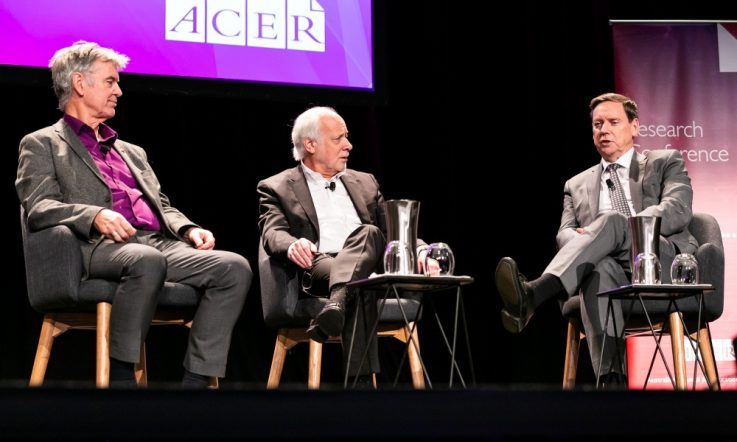This podcast from Teacher magazine is supported by Bank First. Bank First is proud to support the financial wellbeing and professional development of the education community. Visit bankfirst.com.au to find out how they can help you reach your financial goals.
Jo Earp: Hello, you're listening to a Teacher podcast, I'm Jo Earp.
Rebecca Vukovic: I'm Rebecca Vukovic.
Dominique Russell: And I'm Dominique Russell.
JE: Welcome to this special end of year edition, where we take a trip down memory lane and select some of our favourite podcast moments from 2018. We've actually published 26 episodes this year, including a special to mark our 100th, so it's been a difficult choice. But I think I'll get us off to a flying start with an episode from our Global Education series from May, when our guest was UK Art and Textiles teacher Andria Zafirakou, who was winner of the 2018 $1 million Global Teacher Prize.
DR: We spoke about building meaningful relationships with students and parents, the importance of ongoing professional learning, and how she supports students outside school hours. Andria has been an inspiration to others, so I asked if her own teaching methods had been inspired by any personal mentors.
Andria Zafriakou: Oh, that's a really good question. My favourite teacher, the teacher that had the most influence on me was my Music teacher. And just because he was quite extravagant, he was completely loopy. His classes, you would never know what would be coming. They were wild, they were brilliant. They were completely, completely unexpected. I wouldn't say that my classes will ever become like that because that was just so exciting.
I want the children to be engaged. I need them to feel comfortable in my environment. I need them to feel that they can fail and that they can really struggle and that it's okay to struggle. I need them to be working with other students and appreciating other students' work. They will be called upon to critique, called upon to evaluate, called upon to give opinions, constantly. And I think that's something that is really powerful and very important which the Arts subjects can do. It's very significant for all children to be able to experience the power of these subjects.
RV: That was Andria Zafirakou, this year's winner of the Global Teacher Prize. From London to Melbourne, and one of my favourite episodes from our School Improvement series. Noble Park Primary School has students from more than 40 nationalities. Principal David Rothstadt shared some of the ways his school supports migrant and refugee students.
JE: I really enjoyed visiting this school this year. David told us about the different approach they take to placing new students and some of the strategies that staff use to connect with students and, of course, their families. He also spoke about some of the features of the indoor and outdoor learning spaces, and the role of staff.
David Rothstadt: One of the things that we know is that children feel safe and secure if there are nooks and crannies for them, so we construct, we use trellis and we use draped material and the like to soften the room and provide spaces that children can sit in and be secure while they're reading, or doing their writing, or whatever it may be. We know that the children respond really, really well to that environment.
… there's been a lot of thought go into the way [we] create spaces outside. The number one thing I guess is that many, many of our students live in flats or units, so they don't have a back yard, they don't have access to that free play space and, you know, opportunity to engage with nature. Natural pedagogies are really, really important to us at Noble Park Primary School. So, if you walk around our school you will see all the traditional offerings in terms of basketball courts and an open space for kids to kick a soccer ball around and play chasey etcetera, etcetera. But, I can assure you chasey is better here than in most places because we don't have out of bounds areas.
… The Assistant Principal travelled to Europe to look at natural play in forest schools in Scandinavia and in Wales and in Spain and one of the things she came back with was looking at play spaces and developing a forest area. So it's been a labour of love for us over the last three or four years and we now have … [it's] ceasing to be an aspirational forest, it's actually now you can hide in it and it's full of leaf matter, debris, twigs, sticks, branches etcetera, etcetera, that the children can construct with – and they build humpies and they build all sorts of different huts, they make little art installations and so on.
It's again just demonstrating that diversity of choice of opportunity for children at playtime – because children are learning all the time, when they're at school. They're socialising and negotiating during their break times and so we characterise those spaces as playful and diverse. Teachers are really excited because they don't do yard duty here – they do really, they do play support, because we wanted to flip that notion of … yard duty implies walking around like a Sergeant Major and telling kids what not to do. Actually if you're out there with the kids, it's your work, you should be supporting their play and helping with them it, and engaging with them while they're playing.
DR: That was David Rothstadt, Principal of Noble Park Primary School in Melbourne, and you're listening to Teacher's podcast highlights for 2018. My first selection is from our monthly series The Research Files. Dr Emma Sciberras, from the School of Psychology at Deakin University joined us to talk about the Children's Attention Project, which explores the long-term effects that Attention Deficit Hyperactivity Disorder (or ADHD) has on children's behaviour, learning and day-to-day living, and also on their parents' wellbeing.
RV: The study has been running for several years and Emma has worked with scores of schools here in Australia. I spoke to her about the prevalence of ADHD, the research findings and the implications for educators. Here she is sharing some practical advice on how teachers can assist students with ADHD in the classroom.
Emma Sciberras: So there are lots of different strategies that can be tried and I think it's one of those things where it can be a bit of trial and error for students and teachers, to work out what's the best fit for these young children.
I think the very first thing is the teacher understanding the profile of that student – so the individual strengths and weaknesses that the student might be experiencing, so that they can individualise their teaching in some way to that student, which of course is very challenging within a large classroom environment. But, understanding what that profile is, so what the severity of their symptoms are, if there are other co-occurring difficulties, can really help the teacher to understand the severity of the presentation but also what that child's unique strengths are so that they can use those in the classroom.
I think the other thing is trying, where possible, to level the playing field. So we know that kids with ADHD have difficulties writing, so any opportunities be able to type out work, for example, can just help to facilitate engagement from the student. Whether they can listen to things in an audio fashion, whether they can have notes given to them, as opposed to relying on them having to write them down. So I think some really simple strategies like that, or even taking a photo of material so that they can go away and learn and focus on that particular piece of information rather than struggling to write it down can really help.
And I think another thing is about trying to have some leeway where possible. So, we know kids with ADHD fidget and they move a lot and that can be a bit annoying to other people and it can be distracting to other students, but we know that kids with ADHD, that movement can sometimes help them to learn better and to take in information. So I guess working with the student to see if there are other ways that they might be able to still get some of that movement in, but in a less distracting way for other students – so whether it's about letting them doodle when they're listening or whether it's about having set bathroom breaks so they can get up and have a bit of a burst of physical activity.
Other things are like trying to use engaging materials for assignments for example – so can the student produce a website, or a movie of the thing that they're talking about, rather than it always being written? And I guess a lot of these strategies are around trying to enhance the engagement of students in the classroom, because if students are engaged, they're less likely to be disruptive. A few other things … even trying to develop some transition routines, so that the children know how to transition between different activities and it can be something that is pasted on their desk. Breaking down assignments into small components that have separate due dates can also help to keep them on track.
And I think the final thing I'd say is about partnering with the parent and having regular communication with the parent. Because the parent will be struggling with a lot of the similar things that the teacher might be struggling with at home, and the parents are likely to have identified some things that can help. And vice versa – the teacher might come up with things that work in the classroom that the parent might not know about. So, if the parent and teacher can team up and share their wisdom together and keep that regular communication going, then the evidence suggests that that results in the best outcome for not only the child, but also for the parents and teachers in terms of reducing their levels of stress too.
JE: Emma Sciberras there, sharing some of the ways that teachers can support students with ADHD. We're staying with The Research Files for my next selection – Episode 44 to be precise. Helen Egeberg, Master of Teaching coordinator at Edith Cowan University in Western Australia, joined us to talk about her research into what students believe about effective classroom management.
DR: This episode has been one of our most listened to podcasts this year. Students in this study were asked to think about a teacher that they believe creates a really positive learning environment. Helen told me about some of the main findings, including the three characteristics students believed made for ‘good teachers'.
Helen Egeberg: From our report and from our research, the students suggested that the three key elements were: developing and having positive, caring relationships with their teachers; that they wanted and required and needed their teachers to be able to manage them and manage their behaviour – so have authority but without being authoritarian, if you like; and also, they believed that good teachers teach them well, can engage them, make the lessons interesting, make the lessons fun and make it somewhere that the students want to be.
DR: Here's Helen on the implications for teachers.
HE: … I think what we take from this is that classroom management is so much more than just rules, rewards and punishments. Even if it is that – I don't, I'm not quite sure that it is that – and the students would say that it's not about that, but just because you've got rules, just because you're rewarding us or just because you've got a series of punishments, that's not going to help us to behave, nor teach us to behave.
… I think on top of that, what we as teachers need to take from this is that kids do want to learn and they do want to learn in a safe environment and in a positive environment. But they need to be taught. And they need to be taught both academically, but behaviourally as well. They need to be taught how to behave and we as teachers can do that, and part of doing that is showing them that we care about them personally as well as academically. Showing that we are willing to support by giving them high expectations, but solid boundaries, and also showing that we're capable of guiding them in their learning through activating positive ways of learning, through captivating them and making it interesting.
RV: That was Helen Egeberg. One of my favourite interviews of the year was Episode 14 of our School Improvement series. Dr Danny Steele is Principal of Thompson Sixth Grade Center in Alabama. He joined me to discuss the role of a principal in maintaining a positive school culture, and the importance of genuinely listening to parents. In this clip he recalls his first faculty meeting, when he asked staff to develop their own teacher oath to reflect on their own core values as an educator.
Danny Steele: Well when I first came, at our very first faculty meeting, we did an activity where I gave out a copy of the Hippocratic Oath to all of our teachers, which is the oath that physicians take. At least they do it in the States, I don't know if around the world they do something like that, but it's an oath that doctors take – that they're committed to looking after the wellbeing of people and they're always going to do everything they can to save human life and things like this.
And so I asked our teachers to read this and to highlight the phrases from the oath that resonated with them as educators. There would be a line in this oath that would say, ‘I will remember that I don't treat a cancer but I treat a patient', or ‘I don't treat a fever chart but I treat a human being'. And so as a teacher you read that and you think, ‘I don't teach math, I teach kids' or ‘I don't teach fourth grade, I teach students'.
And there were just a lot of things that resonated with educators so we talked about that and then I asked the teachers to work on developing their own teacher oath, which is a commitment, it's basically an articulation of their core values as an educator. It's the things that drive them to come to work, it's their commitments to their kids, to their colleagues, to the parents. And I encourage teachers to post this oath outside their room, I encourage them to put it on their websites. So that's an important step in terms of establishing a foundation of what we're about as educators here at our school.
JE: US Principal Danny Steele there. Well, that was another one of our most popular episodes of the year and it seemed to really strike a chord with listeners. It's nearly the end of the year and I want to finish by looking into the future … a bit further than 2019 though.
DR: Earlier this year I interviewed Australia's Chief Scientist Dr Alan Finkel to discuss the benefits of schools partnering with STEM industry specialists. To finish the episode, I asked if him if he were to enter a classroom in 2030 what he would want to see.
Alan Finkel: Human teachers. Let me elaborate. The last thing I'd want to see is robots in charge of the classes. We are going into a world of AI (artificial intelligence), we are going into a world of technology and robots will be doing more and more for us and if they are there in an assisting capacity, fabulous. No problem with that. But young people, they need peer-to-peer relationships. Young people, they need peer-to-teacher relationships. And I am talking about a human relationship. So I'll use the word humanity, I'd like to see humanity in the classroom – but I'm not using it in its normal sense – I really mean I'd like to see humans doing the teaching and doing it well with a focus on conveying deep discipline skills combined with those enterprise skills we talked about, and fun. There's no reason to trade off one for the other. You can chase expertise and quality at the same time as you're having fun.
RV: That was Dr Alan Finkel, Australia's Chief Scientist. A reminder that these are just a sample of some of our 2018 podcasts. You'll find more than 110 to enjoy in our archive. All of the episodes from The Research Files, Global Education, School Improvement, Behaviour Management, Teaching Methods and Action Research – along with all of our special episodes – are free to download. Just visit acer.ac/teacheritunes or soundcloud.com/teacher-acer.
DR: You can subscribe to our podcast channels to make sure you don't miss an episode. The full transcripts and links to related reading are also available for free on the Teacher website – that's teachermagazine.com.au.
JE: Thanks to everyone who has listened this year, all of our guests and our podcast sponsors. We'll be back in January 2019!
You've been listening to a Teacher podcast supported by Bank First. Bank First has been committed to the education community since 1972 and is proud to be invested in you. Visit bankfirst.com.au to find out more.



